
POSTS can now be found under PROJECTS.
| < PART 2 | - |
Thomas William Bowlby (1818-1860)
Part 3 - Enigma
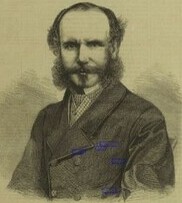
Introduction
Evident from what was written in obituaries, Thomas William Bowlby was held in high esteem in literary circles which is baffling as he did not have a classical education as that for example of another cousin Henry Bond Bowlby (1823 -1894) who also lived in Bishopwearmouth. Russell Bowlby (1795-1865), likewise his cousin who I have written of extensively for previous newsletters, was exceptionally knowledgeable in politics, philosophy and literature. It was in his chambers, that he was an articled clerk in South Shields and Sunderland so to some extent, by association he had a more broad-based education than just with Mr Cowan, his Sunderland tutor.
Although there is no evidence of any preparatory journalism; his writing for the press especially the Times Newspaper in the late 1840‚€™s is also acclaimed. Moving then to the role of foreign correspondent yet with limited evidence of work outside the UK especially not in the Far East is even more unfathomable.
Legal Career
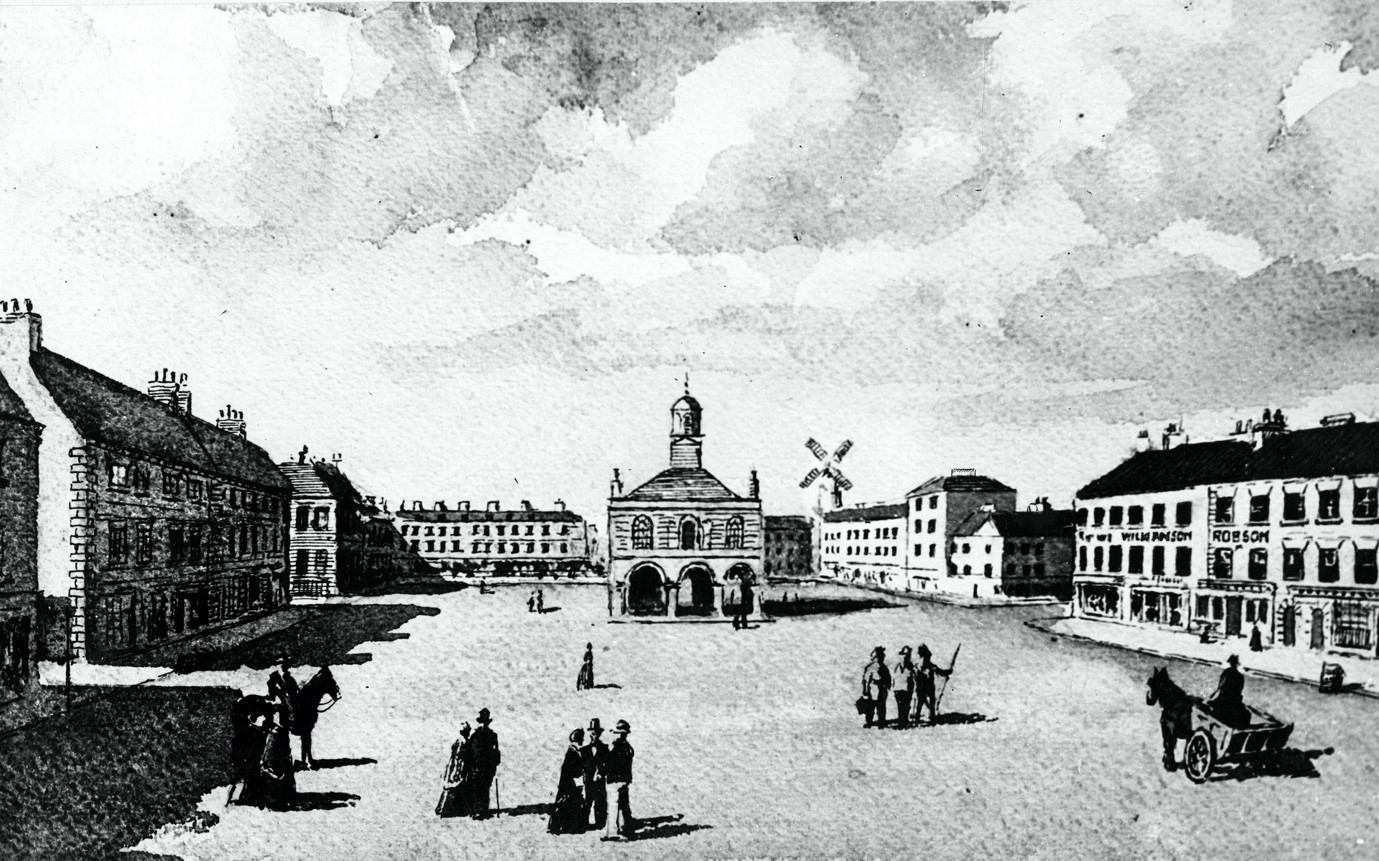
(1) Town Hall in the Market Place, 1856
In less than six months after the Meeting at the News Room, in the Town Hall in the Market Place South Shields, Thomas William Bowlby relocated or partly relocated to Albany Street, Regent's Park and from his obituaries it was stated that he was an articled clerk in Lincoln's Inn Fields. As to how he made the rather meteoric rise from offices of a Sunderland/South Shields practise, that of his cousin Russell Bowlby and partners to the elevated heights of Lincoln's Inn Fields remains without explanation.
1 Messrs. Bicknett, Roberts, Finch and Neate in Chambers at 57 Lincoln's Inn Fields
In the biographies of Thomas William Bowlby it is stated that he was an articled clerk in
Lincoln's Inn Fields this is likely therefore to be the firm he joined (see 2). Rowland Neate Esq. (1811-1851), a friend/associate of Mr Bowlby rose from junior partner to by 1849 the sole practitioner until Jan 1851 when he was incarcerated in an institution for the mentally infirm dying later that year on the 10th October at the age of 40 of a ‚€˜soft brain‚€™.
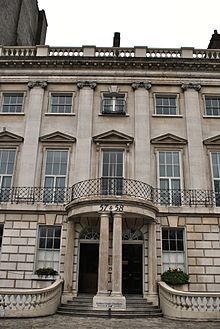
(2) 57-58 Lincoln's Inn Fields, London
2 Lawrence, Crowdy and Bowlby of 25 Old Fish Street, Doctors' Commons, London
An estimation as to when Thomas William Bowlby became a partner in this firm is that of 1850 when his clerkship in Lincoln‚€™s Inn ended as the firm was reduced to only that of Rowland Neate.
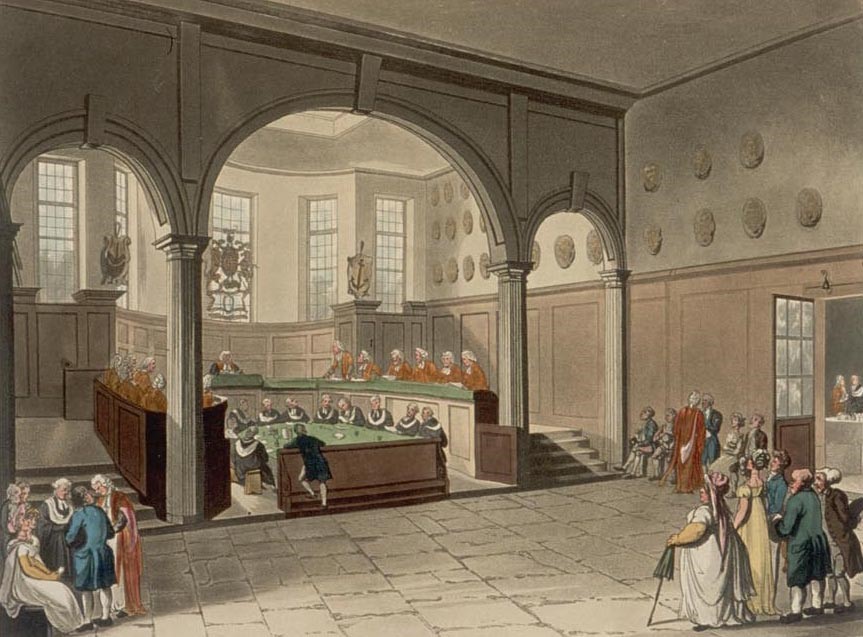
(3) Doctor's Common (1511-1857) also known as College of Civilians
This was a society practising civil law which was in decline by the 1850‚€™s. However, Bowlby‚€™s firm was on the fringe of the society in a seemingly undesirable location of Fish Street impacted by the smell of fish from an area populated by fishmongers.
Court Appearances
There are three incidents involving Thomas William Bowlby accessed via The British Newspaper archive, evaluated separately that in each instance present a totally different perspective of him to that which was in Part 2.
1 Incident at the Theatre Royal in Drury Lane, Sunderland June 1841
'Cowardly and Brutal Assault at Sunderland' (Durham Chronicle-Friday, 18th June 1841)
In terms of chronology, this occurred after the 1841 Census when Thomas William Bowlby was the head of the household in Green Street, Bishopwearmouth, seven months before the death of his father.
On Friday, the 8th June 1841 he had dined in Bishopwearmouth with two fellow articled clerks/solicitors his cousin John Russell Bowlby (1815-1886) of Cleadon Meadows, Cleadon Village son of Russell Bowlby and his friend Thomas Burn.
They then moved to the nearby theatre in Drury Lane (4), the Thomas's, occupied two empty seats in a box without invitation reserved for John Brunton (1802-1867), a Lloyd's Surveyor and his party including his brother and several women. After the performance had started, the inebriated John Russell Bowlby walked into the box, causing a furore insisting that John Brunton should move his legs so that he could move past him to sit in the seat temporarily unoccupied by the brother, blocking the view of the performance. Rude and condescending, by saying to John Brunton "You're no gentleman. Sir." exacerbated the situation as this was considered to be a slur on his character.
The three solicitors and the two Brunton brothers, agreed to move to the box office and meet with the theatre manager, Mr Beverley where there was confirmation of the Brunton‚€™s booking of the box. Seeking satisfaction for the slur, John Brunton tweaked John Russell‚€™s nose with his finger and thumb and by most accounts there was no injury. Whilst John Russell remained in the foyer with his cousin, warming themselves by the fire the other three men returned to the box.
'‚€¶after nursing his wrath about an hour, he returned to the boxes, (standing behind) armed with Paddy's friend, a good shillelagh, the knotty end of which he be applied, with all his muscular power, to Brunton's nose. The consequence was that this fine member of Brunton's frontispiece, lay weltering in its own blood, the claret, as the professionals call it, squirted in all directions, beautifully variegating the splendid. dresses of the ladies. These screamed, the gentlemen stormed, and the performance was abruptly stopped'.
The police were called, John Russell Bowlby was taken to the Station House where he was immediately bailed. On the 9th June the incident was investigated at the Town Hall by magistrates (√Ÿichard White, Esq., Mayor, Edward Backhouse, Esq., Richard Spoor, Esq. Joseph Simpson, Esq., and Dr. Brown) in a packed chamber with many queuing outside. John Brunton, the complainant was heavily bandaged as a result of his facial injury. Several men testified (offence and defence) who had been in the theatre, but with regard to the scope of my writing, it was the testimony of Thomas William Bowlby defending the action of his cousin, claiming that he had been insighted by Mr Brunton tweaking his nose and that he was justified in his retaliation omitting the fact that the attack on Mr Brunton was from behind so he couldn‚€™t defend himself and that there could have been cranial injury. Only a fine of ¬£5 was levied and that no further action was taken against his cousin and fellow solicitor. (5)
Comment
Thomas William Bowlby
* his cousin, and friend seem to have felt some entitlement in sitting in a theatre box the cost of which they had not contributed.
* did not intervene when his cousin caused a fracas demanding a seat in Mr Brunton‚€™s box and disturbing the theatre performance.
* remained with his cousin for an hour or so after Mr Brunton had tweaked John Russell's nose whilst Mr Burn returned to the performance. He did not appear to pacify him it appears, rather that John Russell was hell-bent on revenge.
* did he encourage his cousin to leave the theatre and obtain the weapon?
* was asked by his cousin in his attempt to offer some defence during the hearing 'what should he do', but received no answer from 'Tom'. This suggests that John Russell deferred to his cousin valuing his opinion.
* he was certainly loyal to his cousin as it was his embellished testimony that ensured that John Russell was not incarcerated. He said that his face was bloodied following the tweaking and that he was acting in self-defence. Given that the assault on Mr Brunton was from behind the box, it was not therefore confrontational and as he was probably seated parallel to Mr Brunton he could not have been in full sight'.
2. incident in Oxford Street, London: 18th August 1844
This was just over six months after the Meeting at the News Room, in the Town Hall in the Market Place South Shields that Thomas William Bowlby had relocated or partly relocated to Albany Street, Regent‚€™s Park as this is the address he gives during his attendance at the Police Court, Marlborough Street on the 20th August 1844 and which is also his address at his separate appearance at the Court of Chancery ten years later.
‚€œWhen first struck he should have been disposed to consider the blow in the light of a rough joke, had it not been for the defendant's subsequent insolence and violence‚€Ě.
A concluding and indeed confusing statement uttered by Rowland Neate Esq. (1811-1851) at this Court following the conviction of Isaac Sorrell (1803-1871), a coach driver of a four-wheeled carriage for assaulting him whilst being accompanied by his friend, Thomas William Bowlby, both on horse-back in London‚€™s Oxford Street. It would appear that Isaac Sorrell whilst whipping his horse in his quest to gather speed, inadvertently hit Rowland Neate who in immediate retaliation, used his whip on the coach driver.
Seeking an explanation or indeed retribution, the two horse-riders pursued the coach driver and after several attempts to constrain his horse by reaching for the bridle they only caught-up with him, at Regent‚€™s Quadrant. This developed into a violent incident whereby Rowland Neate and Thomas William Bowby (who was not directly involved) each attacked Mr Sorrell with their whips claiming that this was in self-defence.
The statement made by Mr Bowlby reads as follows: -

(6)
(6) "When Mr. Neate was first assaulted I accompanied him after the defendant, to demand an explanation‚€Ě on reaching the carriage, Mr Sorrell ‚€œstruck Mr Neate several times, with much violence, with his whip, and on this provocation'" he "returned the blows".
In defence, Mr Sorrell said he drove close to Mr Neate's horse not at first noticing him as he was stationery in the middle of the road with his friend, and to avoid them this caused his horse to swerve. Mr Neate then rode up and asked him how he dared to drive so close to him, and afterwards struck him with his whip. He was then pursued by the riders.
Mr Maltby of the Police Court found the case against Mr Sorrell proven ordering him to pay three shillings or be sent to prison for a month. (7)
Comment
The question remains as to why the two men were determined to catch-up with Mr Sorrell and then report the incident to the police when Rowland Neate described the incident as a ‚€œrough joke‚€Ě. It escalated with Thomas William Bowlby seemingly willing to become involved in the attack on Mr Sorrell: two gentlemen riders assaulting a humble coach driver whose only misdemeanour was to ride too closely to one of them as they obstructed the carriageway and then attempt to protect himself.
3. Vice Chancellor Stuart: In Re Lawrence, Crowdy and Bowlby Exparte Burdon-1854
The crux of this case is that brought to the Court by Mr. Rowland Burdon was that Benjamin Lawrence (1789-1866), James Crowdy (1821-1877) and Thomas William Bowlby had misappropriated funds related to the execution of an estate which he, Rowland Burdon was the defendant in the suit of Hamilton v. Burdon initiated in 1850.
‚€˜1854 A motion on behalf of Mr. Rowland Burdon, that Benjamin Lawrence, James Crowdy, and Thomas William Bowlby, solicitors, and each of them, might within three days of the service of the order to be made upon this motion, pay into Court to the credit of the cause of Hamilton v . Burdon , in compliance with an order made in that cause, on the 3rd of August 1852, the sum of 57771. 7s . 4d., together with interest thereon, after the rate of 51. per cent. per annum , from the 28th of February 1853 up to the day of payment; and that the said Benjamin Lawrence, James Crowdy, and Thomas William Bowlby, and each of them , might be also ordered to pay, within three days of the service of the order to be made upon this motion, to the said Rowland Burdon the sum of 12941. 15s . 11d., with interest, after the rate of 51. per cent . per annum , from the 14th of May 1852 , on the sum of 2821. 8s. 6d., part thereof; on the sum of 861. 14s. 7d., further part thereof, from the 2nd of December 1852; on the sum of 1151. 15s. 2d., further part thereof, from the 8th of July 1853; and on the sum of 8091. 16s . 8d., from the 14th of June 1854 up to the day of payment of the same‚€Ě. (8)
NB-Rowland Burdon was the fifth to bear the name.
1 is a monetary suffix for the '£' sign.
There are several accounts of the case in the newspapers of the day the content of which, fails to explain the connection between Rowland Burdon and ‚€˜Hamilton‚€™.(4) Referring to ‚€˜The Equity Reports 1854‚€™ that Rowland Burdon V (1802‚€“1875) of Castle Eden, County Durham jointly with his wife were executors in the estate of Gertrude Ann Fancourt (Uhthoff) Hamilton (1808-1850). She was the sister of Rowland Burdon‚€˜s wife, Anne Malet (Uhthoff) Burdon (1810‚€“1885) the youngest of three ‚€˜Uhthoff‚€™ heiresses, sisters from Bath. Amelia Fancourt (Uhthoff) Hamilton (1807-1892) was the eldest. (9)

(10) Castle Eden
Gertrude Ann the middle sister, had married Thomas George Claude Hamilton (1805-1888), a JP and magistrate in Armagh. She had an exceptionally detailed Will and an impressive portfolio of investments including railway shares, Consols (lucrative Cornish copper-mine shares at their height of value between 1819 and 1858, so a valuable asset in 1850) and East India Company stock.
Gertrude Uhthoff Hamilton (1847-1935) was her only child and a significant beneficiary in her late mother‚€™s estate under the terms of which Mr Burdon and his wife were her guardians.

(11)
Bowlby/Burdon Connections
Rowland Burdon (1756-1838) was one of two MP‚€™s for County Durham between 1790 and 1806 and played a significant role in the development and funding of the Wearmouth Bridge opened in 1796.
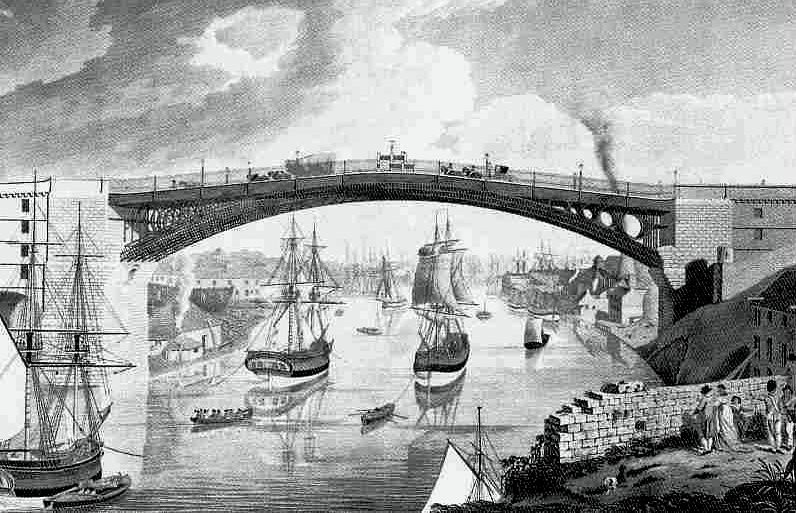
(12) Wearmouth/Sunderland Bridge 1796-1859
His second wife Cotsford Mathews (1778‚€“1851), the mother of Rowland Burdon had military connections through her father which appears significant to the lives of the sunderland Bowlby family; the fact that Thomas William named his first son Charles Cotsford Bowlby in 1849 suggests an established link between the Burdon and Bowlby families sufficient perhaps for Rowland Burdon to entrust the assets of the estate of his sister-in- law to him for selling and investment.
Gertrude Ann Fancourt Unthoff (1808-1850)
She had an impressive portfolio of investments including railway shares, Consols, lucrative Cornish copper-mine shares at their height of value between 1819 and 1858 (so a valuable asset in 1850) and East India Company stock.
Rowland Burdon put his trust completely in Thomas William Bowlby declaring that the other partners, Benjamin Lawrence and James Crowdy were untrustworthy, transferring vast sums of money solely to him of approximately £9,000 whilst of the understanding that Bowlby was in a tripartite partnership.
The intention was that the bulk of the sums realised from the dividends accumulated from the late Mrs Hamilton‚€™s assets, the consols and East India stock should be paid into the Court and then reinvested in further consols.
An extract of a letter received on the 12th May 1852 sent by Bowlby to Burdon
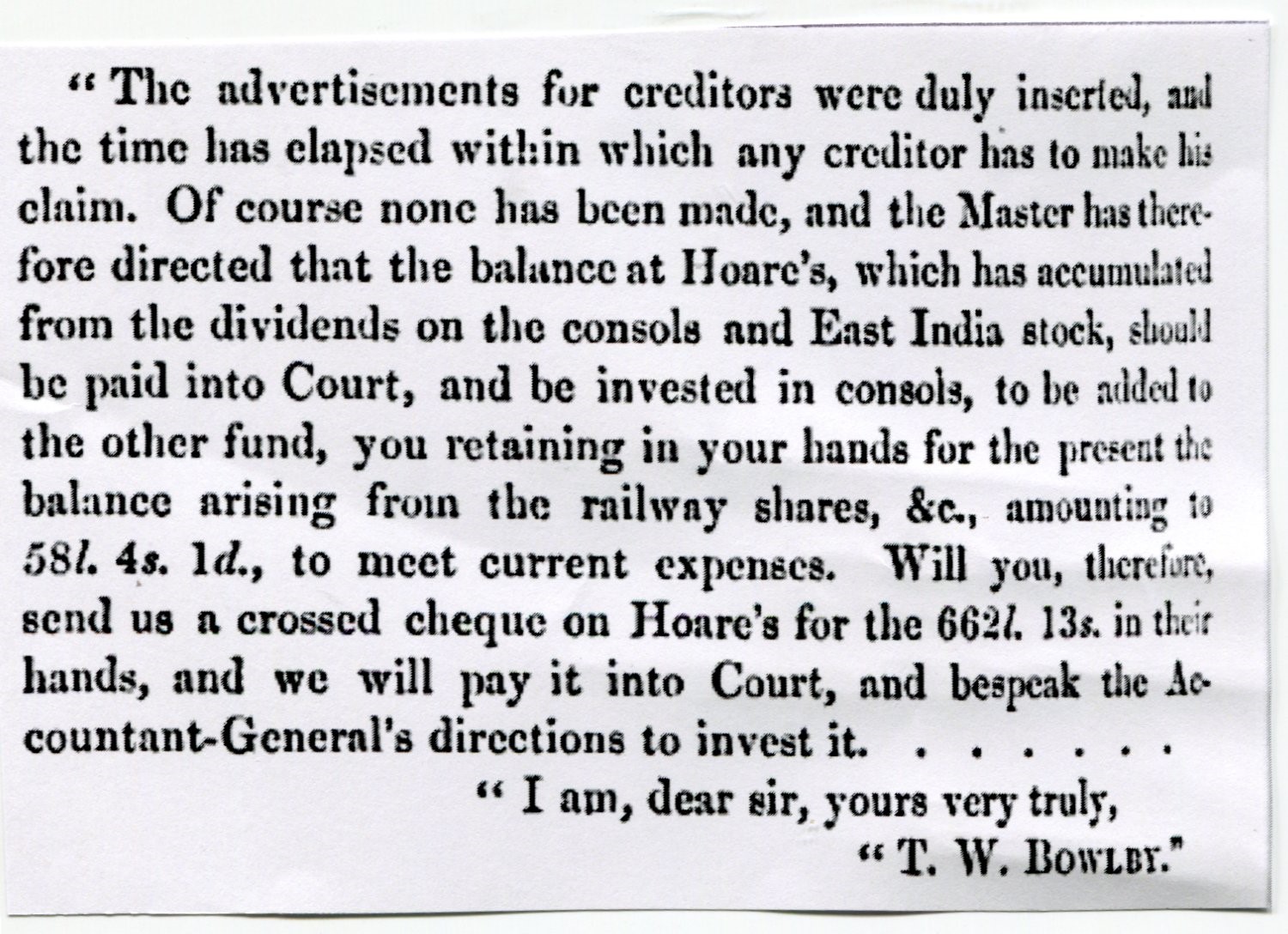
(13) Hoare's
The sums of money specified paid by Rowland Burdon were then retained by Thomas William Bowlby in addition to further of monies from the sale of railway stock eight months later. The position was further exacerbated by the sum of ¬£800 which he had loaned to his late sister-in-law for a mortgage not being received into his bank account despite the fact that the Accountant General had ordered on the 3rd August 1852 the release of this money from Mrs Hamilton‚€™s estate under the terms of the power of attorney which Rowland Burdon had given to Crowdy and Bowlby or either of them.
There is certainly a delay in Rowland Burdon establishing that there was a misappropriation of funds which he appears to have assumed was by the entire firm of Lawrence, Crowdy and Bowlby despite the fact that his communication was seemingly entirely with the latter. In fact Benjamin Lawrence was only a nominal partner which Rowland Burdon said he had not realised until June 1854 which was presumably at the stage when he had already initiated proceedings.
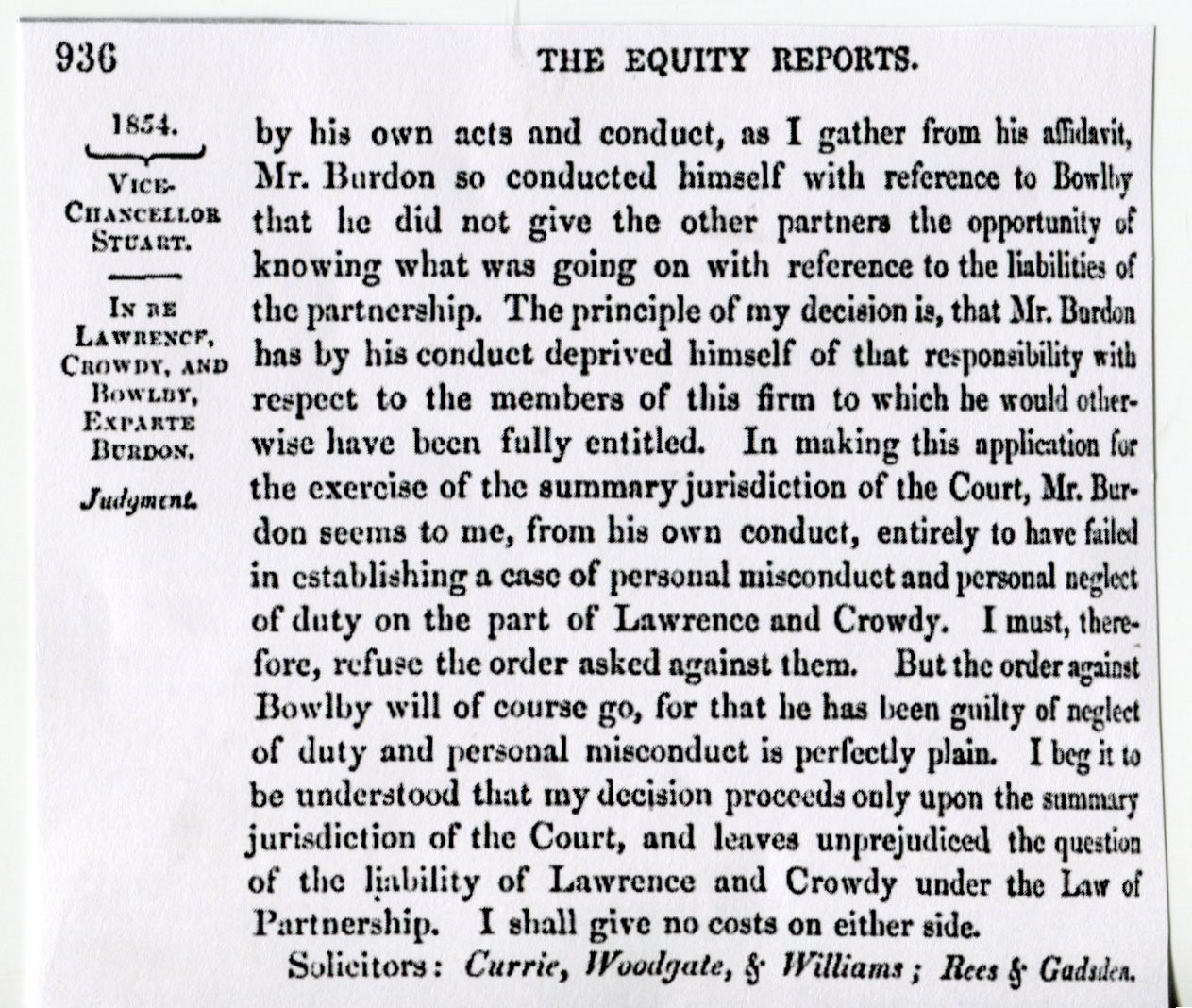
(14) This meant in effect, that his attempt to sue all three partners was rejected and that Rowland Burdon was then left with the only option of suing Bowlby.
Comment
What action was taken by Rowland Burdon following a High Court Judgement of 1854 and the evident fraud by Thomas William Bowlby, I have been unable to establish. There was a period of exile in Belgium with his family between 1855 and 1858 for the latter with temporary residence in Smyrna in 1856/57 when he was employed as a consultant by an investor in the Smyrna and AydńĪn railway which failed. However, before he departed for China in 1860, he had ensured that his children could not be made liable for any of his debts. (see Part 2).
The question therefore remains as to whether the £9,000 or so was returned to Rowland Burdon? Suffice to say, that following the death of Rowland Burdon in 1875 this notice appeared in Dublin newspapers almost twenty-five years after the judgement by Vice-chancellor Stuart suggesting that Henry Alexander Hamilton, Thomas William Tindal and Amelia Fancourt Hamilton were still awaiting settlement for Gertrude Uthoff Hamilton and the estate of her late mother.
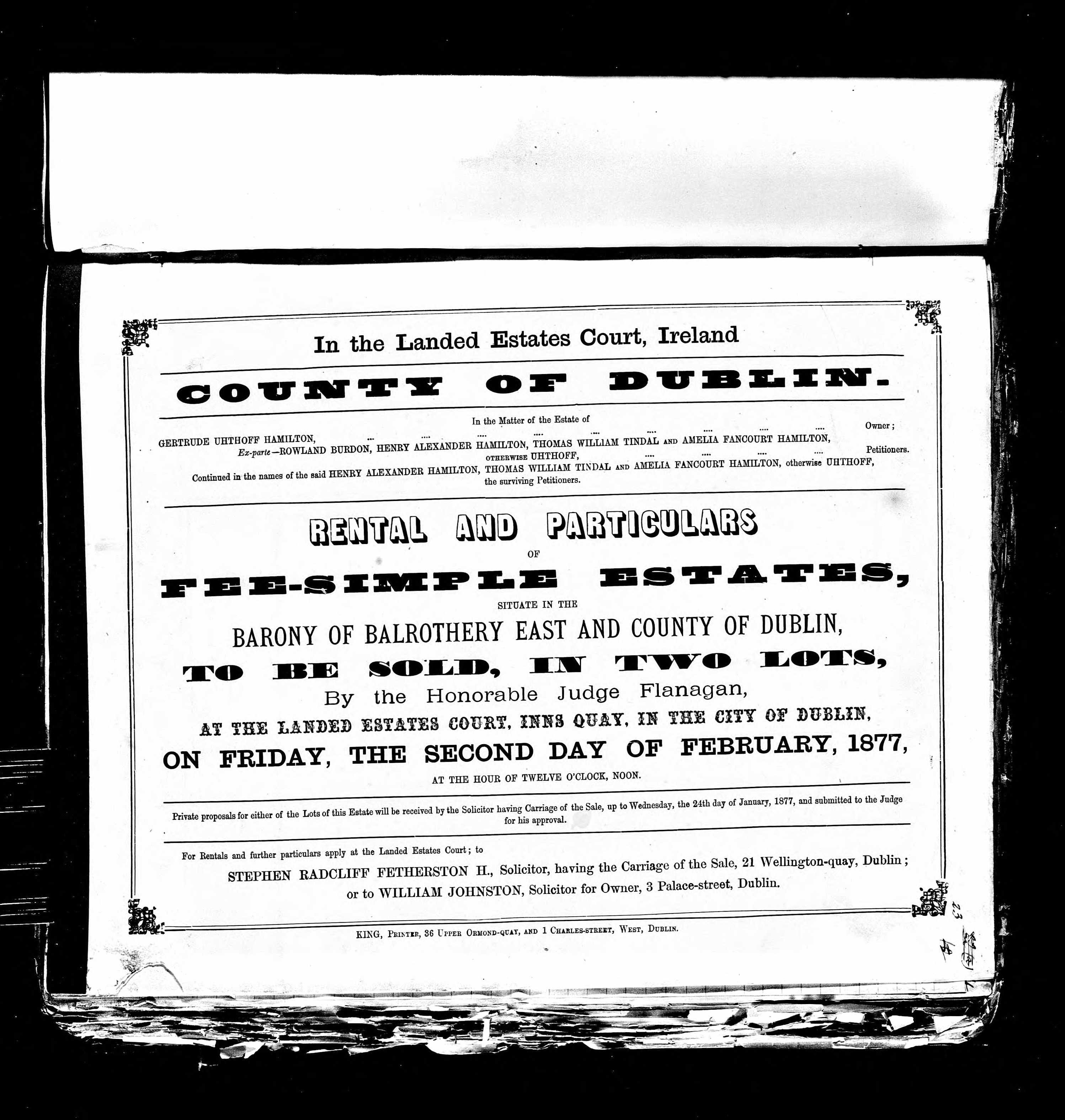

(15) This meant in effect, that his attempt to sue all three partners was rejected and that Rowland Burdon was then left with the only option of suing Bowlby.
Summary
Outlined are three court appearances by Thomas William Bowlby with the first two resulting in verdicts where there was not justice arguably because of his intervention. Class loomed large at this period. Isaac Sorrell, coach proprietor, was found guilty of attacking Mr Neate and Mr Bowlby with his whip for which he received a potential custodial sentence; he probably felt intimidated as he was pursued by two men on horseback along London‚€™s Oxford Street.
And in the case of Mr John Brunton, a Lloyds‚€™ surveyor he may have been deemed of a lower status in society than the Bowlby cousins. Despite the violent attack and his evident head wound, his attacker John Russell Bowlby was only given a fine by the magistrates and the case discharged.
The third case is much more complex; it was of potential fraud committed by Thomas William Bowlby who, had it not been for the negligence of Rowland Burdon in forwarding the proceeds of his sister-in-law‚€™s assets for investment and the settlement of a mortgage solely to him, the third member of the firm of Lawrence, Crowdy and Bowlby and then bringing the case of fraud to the High Court against all members of the partnership where the liability of all three was not proven, Bowlby may have found himself in a debtor‚€™s prison rather than in European exile.
References
1. STH0000546-Black & white photograph from 1856 sketch; South Tyneside Libraries
2. Wikipedia
3. ditto
4. First Theatre Royal in Sunderland built in Drury Lane in the 1760s & redesigned in 1840 (arthurlloyd.co.uk)
5. Durham Chronicle - Friday 18 June 1841 (BNA)
6. Morning Advertiser - Tuesday 20 August 1844 (BNA)
7. London Evening Standard - Thursday 03 August 1854 9BNA)
8. Equity Reports, 1853-1855: Michaelmas term, 1853 to Michaelmas term
9. Ancestry Family Trees
10. Rowland Burdon III, purchased manor in 1758; in 1765 built house (Wikipedia)
11. Ancestry Family Trees
12. Wikipedia
13. ‚€˜Hoares‚€™ -an elite bank founded 1672-(Wikipedia)
14. Equity Reports, 1853-1855: Michaelmas term, 1853 to Michaelmas term
15. Ancestry Family Trees
Notes
57-58 Lincoln‚€™s Inn Fields now adjoined to Lindsey House forming chambers for civil liberties barristers. In his novel, ‚€˜Bleak House‚€™ this was the offices of Mr Tulkingham, the sinister fictional solicitor.